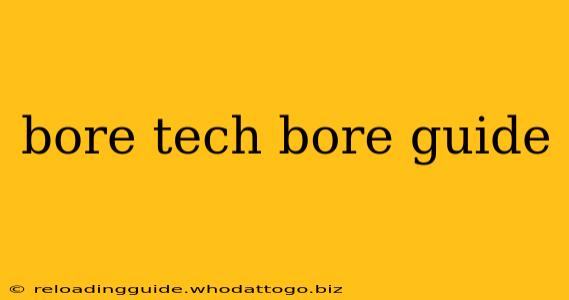The world of precision machining relies heavily on the accuracy and efficiency of boring operations. A crucial component in this process is the bore guide, often overlooked but critical for achieving the desired results. This comprehensive guide will delve into the intricacies of bore tech bore guides, exploring their types, applications, and selection criteria to ensure you choose the right tool for your specific needs.
What is a Bore Tech Bore Guide?
A bore guide, in the context of precision machining, acts as a stable and accurate guide for boring tools. It ensures that the boring bar maintains its alignment throughout the entire operation, preventing deviations that would lead to inaccurate bore diameters, surface finish imperfections, and ultimately, part rejection. This is particularly critical for deep bores and complex geometries where maintaining alignment is challenging. Bore guides from reputable manufacturers like Bore Tech are designed with precision in mind, incorporating features to enhance accuracy, rigidity, and ease of use.
Types of Bore Guides and Their Applications
Several types of bore guides exist, each suited for specific applications and machining requirements. The selection process depends on factors like bore size, depth, material, and the desired level of precision.
1. Fixed Bore Guides:
These guides offer a simple and reliable solution for applications requiring consistent bore diameters. They are typically used for smaller bores and shorter depths where rigidity is less critical. Their fixed nature simplifies setup and operation, making them ideal for high-volume production.
2. Adjustable Bore Guides:
Providing greater flexibility, adjustable bore guides allow for accommodating various bore diameters within a specified range. This eliminates the need for multiple fixed guides, reducing costs and setup time. They are particularly advantageous in shops dealing with a variety of parts and bore sizes.
3. Hydraulic Bore Guides:
For deep and challenging bores, hydraulic bore guides provide superior stability and rigidity. They utilize hydraulic pressure to maintain constant contact between the guide and the bore, minimizing vibrations and ensuring precise alignment. These are commonly employed in large-scale industrial applications demanding exceptional accuracy.
4. Magnetic Bore Guides:
Offering a unique approach, magnetic bore guides utilize powerful magnets to securely attach to the workpiece, eliminating the need for clamping or other fastening mechanisms. This enhances convenience and potentially speeds up setup time. However, workpiece material compatibility is a key consideration.
Selecting the Right Bore Tech Bore Guide: Key Considerations
Choosing the appropriate bore guide involves careful evaluation of several factors:
1. Bore Diameter and Depth:
The bore guide's internal diameter must accurately match the intended bore size. Furthermore, the guide's length should be sufficient to cover the entire depth of the bore to maintain consistent alignment throughout the machining operation.
2. Material Compatibility:
The material of the bore guide should be compatible with the workpiece material to prevent wear, damage, or contamination. Common materials used in bore guides include hardened steel and carbide.
3. Rigidity and Stability:
For demanding applications involving deep bores and large diameters, rigidity and stability are critical. A sturdy bore guide will minimize vibrations and ensure precise alignment.
4. Ease of Use and Setup:
A well-designed bore guide should offer ease of setup and operation, reducing downtime and improving efficiency. Features like quick-release mechanisms and clear alignment indicators can significantly improve usability.
Beyond the Guide: Optimizing the Boring Process
While a high-quality bore guide is essential, achieving optimal results requires a holistic approach. Factors such as tool selection, machining parameters (speed, feed, depth of cut), and coolant application play crucial roles in achieving the desired precision and surface finish.
Careful attention to these factors, coupled with the selection of a suitable bore guide, will significantly improve the accuracy and efficiency of your boring operations. Investing in top-quality bore guides from reputable manufacturers like Bore Tech will ensure that your machining processes achieve consistently high standards, minimizing waste and maximizing profitability.

